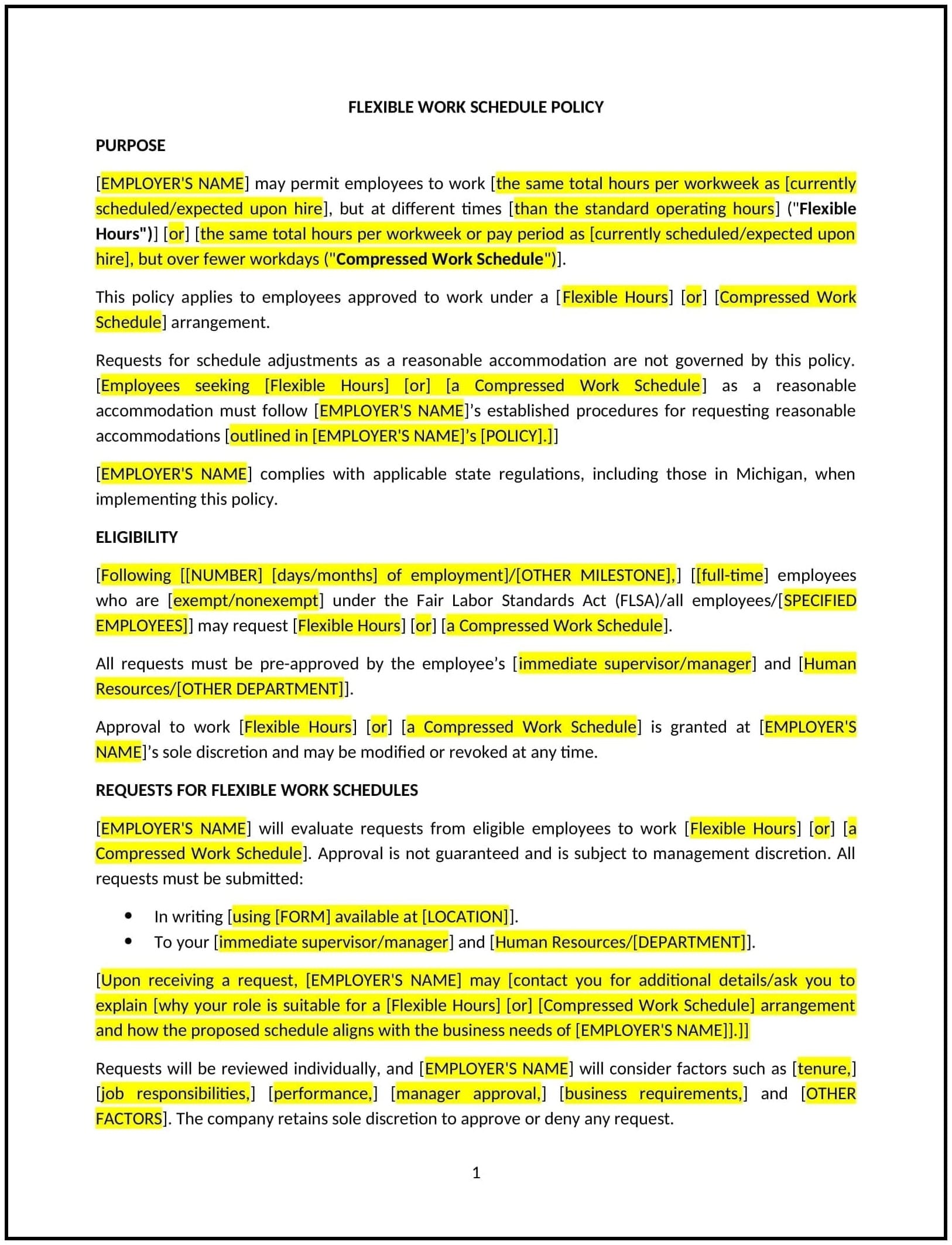Flexible work schedule policy (Michigan): Free template
Got contracts to review? While you're here for policies, let Cobrief make contract review effortless—start your free review now.

Customize this template for free
Flexible work schedule policy (Michigan)
A flexible work schedule policy provides Michigan businesses with guidelines for offering employees the ability to adjust their work hours or location to better fit personal needs while maintaining business operations. This policy supports work-life balance, employee productivity, and job satisfaction by allowing for greater flexibility in how, when, and where work is completed.
By adopting this policy, businesses can attract and retain talent, reduce absenteeism, and promote a more adaptable and productive work environment.
How to use this flexible work schedule policy (Michigan)
- Define eligibility criteria: Clearly specify which employees are eligible for flexible work schedules based on role, performance, or business needs. Include any requirements, such as tenure or job responsibilities, that determine eligibility.
- Set guidelines for flexible hours: Outline the parameters of flexible work hours, such as core business hours when employees must be available and the flexibility allowed outside those hours. Define the expectations for meeting deadlines, availability, and collaboration.
- Offer remote work options: Specify whether employees can work remotely, the frequency of remote work, and any expectations for availability and communication while working from home or other locations.
- Address communication expectations: Establish guidelines for maintaining effective communication when working flexibly, including how to check in, collaborate, and stay aligned with team goals, both in person and remotely.
- Provide request and approval procedures: Set a clear process for requesting flexible work schedules, including how employees can submit requests, what documentation may be required, and how decisions will be made.
- Establish performance metrics: Specify how performance will be measured for employees on flexible work schedules, including key performance indicators (KPIs) related to productivity, collaboration, and goal achievement.
- Monitor and review regularly: Regularly review the flexible work schedule policy to ensure it remains effective, aligned with business goals, and compliant with Michigan state laws.
Benefits of using this flexible work schedule policy (Michigan)
This policy provides several key benefits for Michigan businesses:
- Improves employee work-life balance: Offering flexible work schedules helps employees manage personal commitments while meeting work expectations, improving job satisfaction and retention.
- Increases productivity: Flexible schedules can lead to higher productivity by allowing employees to work during their most productive hours or from environments where they are most comfortable.
- Reduces absenteeism: By offering flexible hours or remote work options, businesses can reduce the number of sick days or personal days employees take, as they can adjust their schedule to accommodate personal needs.
- Enhances talent attraction and retention: Businesses offering flexible work options are often viewed more favorably by employees, making it easier to attract and retain top talent, especially in competitive job markets.
- Promotes a culture of trust: By allowing employees to manage their schedules, businesses show trust in their staff, which can lead to increased morale, engagement, and loyalty.
Tips for using this flexible work schedule policy (Michigan)
- Communicate the policy clearly: Ensure that employees are aware of the flexible work schedule policy by including it in the employee handbook, during onboarding, and through ongoing communication.
- Implement clear guidelines: Set clear expectations around communication, availability, and performance for employees working flexibly to avoid confusion and ensure productivity is maintained.
- Be consistent in applying the policy: Apply the policy fairly across the organization to prevent any claims of favoritism or inequity. Ensure that all eligible employees have equal access to flexible work arrangements.
- Monitor and adjust: Regularly assess how flexible work schedules are impacting business operations and employee performance, and make adjustments to the policy as necessary.
- Review legal considerations: Ensure that the flexible work schedule policy complies with Michigan labor laws and federal regulations, particularly regarding overtime, meal breaks, and other labor requirements.